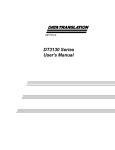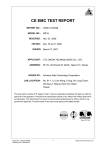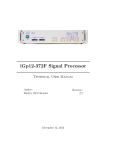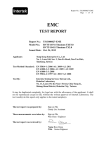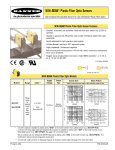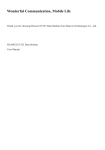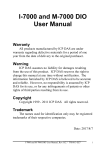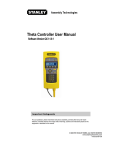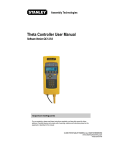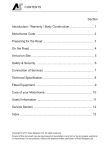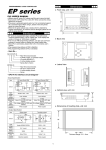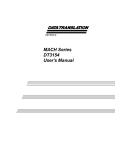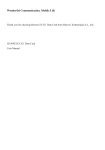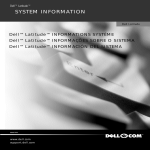Download TEST REPORT - ICP DAS USA`s I
Transcript
Report No.: EME-041156 Page 1 of 39 EMC TEST REPORT Report No.: EME-041156 Model No.: I-7005, I-7015, I-7019R, I-7045, I-7045D, I-7051, I-7051D, I-7055, I-7055D, I-7530, I-87017R, I-87018R, I-87040, I-87041, M-7017, M-7017-232, M-7017R, M-7018, M-7018R, M-7019R, FR-2053, FR-2057, SG-3016, I-2541 Issued Date: Dec. 13, 2004 Applicant: ICP DAS Co., Ltd. No. 111, Kuangfu N. Rd., Hukou Shiang, Hsinchu, Taiwan Test By: Intertek Testing Services Taiwan Ltd. No. 11, Lane 275, Ko-Nan 1 Street, Chia-Tung Li, Shiang-Shan District, Hsinchu City, Taiwan This test report consists of 39 pages in total. It may be duplicated completely for legal use with the allowance of the applicant. It shall not be reproduced except in full, without the written approval of Intertek Laboratory. The test result(s) in this report only applies to the tested sample(s). Project Engineer Reviewed By Brandon Huang Rico Deng Report No.: EME-041156 Page 2 of 39 Table of Contents 1. General Information ..................................................................................................... 5 1.1 Identification of the EUT........................................................................................ 5 1.2 Additional information about the EUT................................................................... 5 1.3 Peripherals equipment ............................................................................................ 6 2. Test Summary ............................................................................................................... 7 3. Test Specifications ........................................................................................................ 8 3.1 Standards ................................................................................................................ 8 3.2 Mode of operation during the test........................................................................... 8 3.3 Performance criteria ............................................................................................... 9 3.4 Performance verification ........................................................................................ 9 4. EN 55022 Conducted Emission Test .......................................................................... 10 4.1 Mains Terminals Emission Test............................................................................ 10 4.1.1 Operating Environment ..................................................................................... 10 4.1.2 Test Procedure ................................................................................................... 10 4.1.3 Test Equipment ...................................................................................................11 4.1.4 Conducted Emission Limit .................................................................................11 4.1.5 Uncertainty of Conducted Emission...................................................................11 4.1.6 Mains Terminals Emission Data........................................................................ 12 5. EN 55022 Radiated Emission Test ............................................................................. 14 5.1 Operating Environment ........................................................................................ 14 5.2 Test Procedure ...................................................................................................... 14 5.3 Test Equipment ..................................................................................................... 15 5.4 Radiated Emission Limit ...................................................................................... 15 5.5 Uncertainty of Radiated Emission........................................................................ 15 5.6 Radiated Emission Test Data ................................................................................ 16 6. EN 61000-3-2 Harmonics........................................................................................... 18 6.1 Operating Environment ........................................................................................ 18 6.2 Test Procedure ...................................................................................................... 18 6.3 Test Equipment ..................................................................................................... 18 6.4 Test Result ............................................................................................................ 19 7. EN 61000-3-3 Voltage Fluctuations-Flicker............................................................... 20 7.1 Operating Environment ........................................................................................ 20 7.2 Test Procedure ...................................................................................................... 20 7.3 Test Equipment ..................................................................................................... 20 7.4 Test result.............................................................................................................. 21 Report No.: EME-041156 Page 3 of 39 8. IEC 61000-4-2 Electrostatic Discharge Immunity Test.............................................. 22 8.1 Operating Environment ........................................................................................ 22 8.2 Purpose ................................................................................................................. 22 8.3 Test Set-Up ........................................................................................................... 22 8.4 Test Conditions ..................................................................................................... 22 8.5 Test Equipment ..................................................................................................... 23 8.6 Test Result ............................................................................................................ 23 9. IEC 61000-4-3 Radiated, Radio-Frequency, Electromagnetic Field Immunity ......... 25 Test.............................................................................................................................. 25 9.1 Operating Environment ........................................................................................ 25 9.2 Purpose ................................................................................................................. 25 9.3 Test Set-Up ........................................................................................................... 25 9.4 Test Conditions ..................................................................................................... 25 9.5 Test Equipment ..................................................................................................... 26 9.6 Generation Of The Electromagnetic Field............................................................ 26 9.7 Test Results........................................................................................................... 27 10. IEC 61000-4-4 Electrical Fast Transient/Burst Immunity Test ................................ 28 10.1 Operating Environment ...................................................................................... 28 10.2 Purpose ............................................................................................................... 28 10.3 Test Set-Up ......................................................................................................... 28 10.4 Test Condition..................................................................................................... 28 10.5 Test Equipment ................................................................................................... 29 10.6 Test Results......................................................................................................... 29 11. IEC 61000-4-5 Surge Immunity Test ....................................................................... 30 11.1 Operating Environment ...................................................................................... 30 11.2 Purpose ............................................................................................................... 30 11.3 Test Set-Up ......................................................................................................... 30 11.4 Test Conditions ................................................................................................... 30 11.5 Test Equipment................................................................................................... 31 11.6 Test Results ......................................................................................................... 31 12. IEC 61000-4-6 Immunity To Conducted Disturbances, Inducted By ...................... 32 Radio-Frequency Fields.............................................................................................. 32 12.1 Operating Environment ...................................................................................... 32 12.2 Purpose ............................................................................................................... 32 12.3 Test Set-Up ......................................................................................................... 32 12.4 Test Conditions ................................................................................................... 32 12.5 Test Equipment ................................................................................................... 33 12.6 Generation And Calibration Of The Disturbance Signal.................................... 33 12.7 Test Results......................................................................................................... 34 Report No.: EME-041156 Page 4 of 39 13. IEC 61000-4-11 Voltage Dips, Short Interruptions And Voltage Variations ............ 35 Immunity Test............................................................................................................. 35 13.1 Operating Environment ...................................................................................... 35 13.2 Purpose ............................................................................................................... 35 13.3 Test Set-Up ......................................................................................................... 35 13.4 Test Condition..................................................................................................... 35 13.5 Test Equipment ................................................................................................... 35 13.6 Generation Of The Disturbance Signal .............................................................. 36 13.7 Test Result .......................................................................................................... 36 Appendix A1: External photo of EUT .......................................................................... 37 Appendix B1: Conducted Emission Test Set-up........................................................... 38 Appendix B2: Radiated Emission Test Set-up.............................................................. 39 Report No.: EME-041156 Page 5 of 39 1. General Information 1.1 Identification of the EUT Product: Model No.: Applicant: Rated Power: Power Cord: ICPDAS CPU with Converter I-7005 ICP DAS Co., Ltd. 230Vac, 50Hz 3C×18AWG ×1.5meter with 2 cores Data Cable: Fiber cable 10meter × 1 Sample receiving date: Nov. 25, 2004 Testing date: Nov. 26, 2004 ~ Dec.8, 2004 1.2 Additional information about the EUT The EUT is an ICPDAS CPU with Converter, and was defined as information technology equipment. According to the hardware aspect, we verified the models listed as below are series model to I-7005 (EUT), the difference please refer to the following table: Model Number Firmware I-7005 8- channel Thermistor Input and 6-channel Alarm Output Module I-7015 6-channel RTD Input Module I-7019R 8-channel Universal Analog Input Module I-7045 16-channel Isolated Digital Output Module I-7045D I-7045 with LED Display I-7051 16-channel Isolated Digital Input Module I-7051D 16-channel Isolated Digital Input Module I-7055 8-channel Isolated Digital Input and 8-channel Isolated Digital Output Module I-7055D 8-channel Isolated Digital Input and 8-channel Isolated Digital Output Module I-7530 Intelligent RS-232 to CAN converter I-87017R 8-channel Analog Input Module Report No.: EME-041156 Page 6 of 39 Model Number Firmware I-87018R 8-channel Thermocouple Input Module I-87040 32-channel Isolated Digital Input Module I-87041 32-channel Isolated Digital Output Module M-7017 8-channel Analog Input Module M-7017-232 8-channel Analog Input Module M-7017R 8-channel Analog Input Module with High Over Voltage Protection M-7018 8-channel Thermocouple Input Module M-7018R 8-channel Thermocouple Input Module with High Over Voltage Protection M-7019R 8-channel Universal Input Module with High Over Voltage Protection FR-2053 16-channel Isolated Digital Input Module FR-2057 16-channel Isolated Digital Output Module SG-3016 Isolated Strain Gauge Input Module I-2541 RS-232/422/485 to Fiber Optic Converter For more detail features, please refer to user's Manual. 1.3 Peripherals equipment Peripherals Notebook PC Manufacturer Dell Fiber Optic Converter ICP DAS Product No. Serial No. PP01L CN-03P83-48643-33O-3930 I-2541 N/A Report No.: EME-041156 Page 7 of 39 2. Test Summary Emission Test Type Result Standard EN 55022: 1998 +A1: 2000+A2: 2003 Class B EN 61000-3-2: 2000 Class A EN 61000-3-3: 1995 +A1: 2001 Remarks Conducted Test PASS Pass by –2.60 dB at 0.155 MHz Neutral Phase Radiated Test PASS Pass by –5.61 dB at 100.8 MHz With antenna polarization vertical PASS Meet the requirements PASS Meet the requirements Harmonic current Emissions Voltage fluctuation & Flicker Immunity (EN 55024: 1998+A1: 2001+A2: 2003) Standard Test Type Result Performance Criteria IEC 61000-4-2: 1995+A1: 1998+ A2: 2000 ESD test PASS Criterion B IEC 61000-4-3: 2002 RS test PASS Criterion A IEC 61000-4-4: 2004 EFT test PASS Criterion B IEC 61000-4-5: 2001 Surge test PASS Criterion B IEC 61000-4-6: 2003 CS test PASS Criterion A IEC 61000-4-11: 1994+A1: 2001 Dip test PASS 1. >95% reductionPerformance Criterion B 2. 30% reductionPerformance Criterion C 3. >95% reductionPerformance Criterion C Test Judgment Meets the requirements of Performance Criterion A Meets the requirements of Performance Criterion A Meets the requirements of Performance Criterion A Meets the requirements of Performance Criterion A Meets the requirements of Performance Criterion A Meets the requirements of Voltage Dips: 1. >95% reductionPerformance Criterion A 2. 30% reductionPerformance Criterion A 3. >95% reductionPerformance Criterion B Remark: The EUT has been tested/evaluated and pass the EN 55022 without modification. Report No.: EME-041156 Page 8 of 39 3. Test Specifications 3.1 Standards EN 55022: 1998+A1: 2000+A2: 2003 Electromagnetic compatibility - requirements for radio disturbance characteristics of information technology equipment. EN 61000-3-2: 2000 Electromagnetic compatibility ─ Part 3. Limits Section 2. Limits for harmonic current emissions (equipment input current ≤ 16 A per phase) EN 61000-3-3: 1995+A1: 2001 Electromagnetic compatibility ─ Part 3. Limits Section 3. Limitation of voltage fluctuations and flicker in low-voltage supply systems for equipment with rated current ≤ 16 A EN 55024: 1998+A1: 2001+A2: 2003 Information technology equipment - Immunity characteristics Limits and methods of measurement. 3.2 Mode of operation during the test The EUT was supplied with 230Vac, 50Hz The EUT was tested in normal operating mode. Magnetic field immunity test: The equipment does not contain devices components susceptitable to magnetic fields, therefore, the test waived can be ignored. Report No.: EME-041156 Page 9 of 39 3.3 Performance criteria The performance criteria are based on the general criteria in the standard and specified by the manufacturer/derived from the product specification. Criteria A: The equipment shall continue to operate as intended. No performance or loss of function is allowed below performance level specified by manufacturer. Criteria B: Loss of function is allowed, provided the function self-recoverable or restored by the operation of the controls by the user in accordance with manufacturers instructions or after the test the equipment shall continue to operate as intended. Degradation of performance or loss of function is allowed after the application of the phenomena below a performance level specified by the manufacturer. During the test, degradation of performance is allowed. However, no change of actual operating state or stored data is allowed. Criteria C: Temporary degradation or loss of function or performance that requires operator Intervention or system reset. 3.4 Performance verification The EUT has been monitored (or observed) based on manufacturer’s specification; the performance fulfilled the requirements of standard. Report No.: EME-041156 Page 10 of 39 4. EN 55022 Conducted Emission Test 4.1 Mains Terminals Emission Test 4.1.1 Operating Environment Temperature: 23 ℃ (10-40℃) Relative Humidity: 55 % (10-90%) Atmospheric Pressure: 1023 hPa (860-1060hPa) Test Voltage: 230Vac, 50Hz 4.1.2 Test Procedure AC Power AMN EUT Peripherals EMI Receiver The EUT along with its peripherals were placed on a 1.0m(W)×1.5m(L) and 0.8m in height wooden table and the EUT was adjusted to maintain a 0.4meter space from a vertical reference plane. The EUT was connected to power mains through a Artificial Mains Network (AMN), which provided 50 ohm coupling impedance for measuring instrument and the chassis ground was bounded to the horizontal ground plane of shielded room. The excess power cable between the EUT and the AMN was bundled. All connecting cables of EUT and peripherals were moved to find the maximum emission Report No.: EME-041156 Page 11 of 39 4.1.3 Test Equipment Equipment Brand Model No. Intertek ID No. Next Cal. Date EMI Receiver Rohde & Schwarz ESCS 30 EC318 06/18/2005 AMN Rohde & Schwarz EHS3-Z5 EC320 01/08/2005 AMN Rohde & Schwarz ESH3-Z5 EC344 01/14/2005 Shield Room N/A N/A N/A N/A Note: The above equipments are within the valid calibration period. 4.1.4 Conducted Emission Limit Freq. (MHz) Maximum RF Line Voltage Class A (dBμV) Class B (dBμV) Q.P. Avg. Q.P. Avg. 0.15~0.50 79 66 66~56 56~46 0.50~5.00 73 60 56 46 5.00~30.0 73 60 60 50 4.1.5 Uncertainty of Conducted Emission Expanded uncertainty (k=2) of conducted emission measurement is ±2.6 dB. Report No.: EME-041156 Page 12 of 39 4.1.6 Mains Terminals Emission Data Phase: Line Model No.: I-7005 Test Condition: Normal operating mode Remark: 1. Corr. Factor (dB)= AMN Factor (dB) + Cable Loss (dB) 2. Margin (dB) = Level (dBuV) – Limit (dBuV) Report No.: EME-041156 Page 13 of 39 Phase: Neutral Model No.: I-7005 Test Condition: Normal operating mode Remark: 1. Corr. Factor (dB)= AMN Factor (dB) + Cable Loss (dB) 2. Margin (dB) = Level (dBuV) – Limit (dBuV) Report No.: EME-041156 Page 14 of 39 5. EN 55022 Radiated Emission Test 5.1 Operating Environment 28 ℃ (10-40℃) Atmospheric Pressure: 1023 hPa (860-1060hPa) Relative Humidity: 40 % (10-90%) Test Voltage: 230Vac, 50Hz Temperature: 5.2 Test Procedure Antenna Tower 1.0~4.0 m 10 m Receiver Antenna EUT 0.8 m Ground Plane □ Peripherals RF Test Receiver Radiated testing was performed at a 10 meters open area test site. The equipment under test were placed on a turntable top 0.8 m above ground. The table was 360 degrees to determine the position of the highest radiation. EUT is set 10 meters from the EMI receiving antenna, which is mounted on a variable height mast. The antenna height is varied between one meter and four meters above ground to find the maximum value of the field strength. Both horizontal polarization and vertical polarization of the antenna was set to conduct the measurement. The bandwidth was set on the EMI meter 120 kHz. The levels are quasi peak value readings. The frequency spectrum from 30 MHz to 1000 MHz was investigated. Report No.: EME-041156 Page 15 of 39 5.3 Test Equipment Equipment Brand Model No. Intertek ID No. Next Cat. Date EMI Receiver Rohde & Schwarz ESCS 30 EC318 06/18/2005 EMI Spectrum Rohde & Schwarz ESMI EC317 07/14/2005 Turn Table Electro-Metrics EM4710 EP306 06/06/2005 Bilog Antenna Schaffner CBL611213 EC367 02/06/2005 Antenna Tower Electro-Metrics EM-4720 EP307 06/06/2005 Ferrite Clamp Rohde & Schwarz EZ-24 N/A N/A Note: The above equipments are within the valid calibration period. 5.4 Radiated Emission Limit Class A(dBμV/m) Class B(dBμV/m) Frequency (MHz) Distance(m) 30~230 10 40 30 230~1000 10 47 37 Note: 1. The tighter limit shall apply at the edge between two frequency bands. 2. Distance refers to the distance in meters between the measuring instrument Antenna and the closest point of EUT . 5.5 Uncertainty of Radiated Emission Expanded uncertainty (k=2) of radiated emission measurement is ±3.58 dB. Report No.: EME-041156 Page 16 of 39 5.6 Radiated Emission Test Data Polarity: Model No.: Test Condition: Vertical I-7005 Normal operating mode Remark: 1. Level (dBμV/m)= Factor (dB/m)+ Read Level (dBμV) 2. Factor = Antenna Factor (dB/m) + Cable Loss (dB) 3. Over Limit (Margin) (dB) = Level (dBμV/m) – Limit Line(dBμV/m) Report No.: EME-041156 Page 17 of 39 Polarity: Model No.: Test Condition: Horizontal I-7005 Normal operating mode Remark: 1. Level (dBμV/m)= Factor (dB/m)+ Read Level (dBμV) 2. Factor = Antenna Factor (dB/m) + Cable Loss (dB) 3. Over Limit (Margin) (dB) = Level (dBμV/m) – Limit Line(dBμV/m) Report No.: EME-041156 Page 18 of 39 6. EN 61000-3-2 Harmonics 6.1 Operating Environment Temperature: 25 ℃ Atmospheric Pressure: 1023 Relative Humidity: 56 % Test Voltage: hPa 230Vac, 50Hz 6.2 Test Procedure Harmonics of the fundamental current were measured up to 2 kHz using a digital power analyzer. The test voltage was supplied from an AC source, which meets the requirements according to the standard. The steady-state harmonic current measurements were carried out using averaging. The transitory harmonics were measured during an observation period of 2.5 minutes. The disturbance duration time (limit 15 s) is defined as the total time under which the transitory harmonics exceeds the limit level for steady-state harmonics during an observation period of 2.5 minutes. 6.3 Test Equipment Equipment Brand Model No. Intertek ID No. Next Cal. Date EMC Emission EMC Partner HARMONICS-1000 EC364 Tester Note: The above equipments are within the valid calibration period. 10/07/2005 Report No.: EME-041156 Page 19 of 39 6.4 Test Result EUT: I-7005 CLASSIFICATION: SUMMARY RESULT: CLASS A PASS Harmonic Current Results Hn AMPs Current Limit Result Hn AMPs Current Limit Result 1 0.130 NaN Pass 21 0.001 0.107 Pass 2 0.008 1.080 Pass 22 0.001 0.084 Pass 3 0.023 2.300 Pass 23 0.001 0.098 Pass 4 0.003 0.430 Pass 24 0.000 0.077 Pass 5 0.015 1.140 Pass 25 0.001 0.090 Pass 6 0.003 0.300 Pass 26 0.000 0.071 Pass 7 0.004 0.770 Pass 27 0.001 0.083 Pass 8 0.002 0.230 Pass 28 0.000 0.066 Pass 9 0.002 0.400 Pass 29 0.001 0.078 Pass 10 0.0001 0.184 Pass 30 0.000 0.061 Pass 11 0.002 0.330 Pass 31 0.001 0.073 Pass 12 0.001 0.153 Pass 32 0.000 0.058 Pass 13 0.002 0.210 Pass 33 0.001 0.068 Pass 14 0.001 0.131 Pass 34 0.000 0.054 Pass 15 0.002 0.150 Pass 35 0.000 0.064 Pass 16 0.001 0.115 Pass 36 0.000 0.051 Pass 17 0.001 0.132 Pass 37 0.000 0.061 Pass 18 0.001 0.102 Pass 38 0.000 0.048 Pass 19 0.001 0.118 Pass 39 0.001 0.058 Pass 20 0.001 0.092 Pass 40 0.000 0.046 Pass Report No.: EME-041156 Page 20 of 39 7. EN 61000-3-3 Voltage Fluctuations-Flicker 7.1 Operating Environment Temperature: 25 ℃ Atmospheric Pressure: 1023 Relative Humidity: 56 % Test Voltage: hPa 230Vac, 50Hz 7.2 Test Procedure The voltage changes at the supply terminals were measured using the voltage method. The test voltage was supplied from an AC source which meets the requirements according to the standard. The voltage source has virtually zero internal impedance and is connected (1 phase) Z = 0.4 + j 0.25Ω (total impedance) (3 phases) Impedance in line conductor: Za = 0.25 + j 0.25 Ω Impedance in neutral conductor: Zn = 0.15 +j 0.10 Ω The short-term flicker Pst is measured during a time interval of 10 minutes. The long-term flicker Plt is evaluated from 12 subsequently measured short-term flicker values. 7.3 Test Equipment Equipment Brand Model No. Intertek ID No. Next Cal. Date EMC Emission EMC Partner HARMONICS-1000 EC364 Tester Note: The above equipments are within the valid calibration period. 10/07/2005 Report No.: EME-041156 Page 21 of 39 7.4 Test result EUT: I-7005 SUMMARY RESULT: PASS TEST CONDITIONS: STANDARD TEST CONDITIONS Pst max Plt max dc % dmax % d(t) Sec. EUT DATA 0.010 0.010 LIMIT 1.00 0.65 RESULT PASS PASS 0.15 0.30 0.00 3.30 4.00 0.50 PASS PASS PASS TEST ENABLED ⌧ Report No.: EME-041156 Page 22 of 39 8. IEC 61000-4-2 Electrostatic Discharge Immunity Test 8.1 Operating Environment 20 ℃ (15-35℃) Temperature: Relative Humidity: 48 % (30-60%) Atmospheric Pressure: 1023 hPa Test Voltage: 230Vac, 50Hz 8.2 Purpose The object of the test is to evaluate the ESD immunity performance of EUT. 8.3 Test Set-Up A horizontal coupling plane (HCP) was placed on a non-metallic table 0.8 m above a reference ground plane (RGP) and connected to it with a cable with two 470 kΩ resistors. The EUT was placed on an insulation sheet on the HCP and was operated according to the specified operating mode. A vertical coupling plane (VCP) was connected to the RGP with a cable with two 470 k Ω resistors. 8.4 Test Conditions Test level: Air discharge Contact discharge ------------- +/- 8kV +/- 4kV Single discharge at 1 second interval positive discharge and negative discharge The selected test points are listed in this table, the numbers refer to the figures attached. Report No.: EME-041156 Page 23 of 39 8.5 Test Equipment Equipment Manufacturer Electrostatic Discharge System NoiseKen Model No. Intertek ID No. Next Cal. Date ESS-2002 EC362 06/17/2005 Note: The above equipments are within the valid calibration period. 8.6 Test Result Applied Voltage (kV) Total No. of Discharge (Each Point) Result Criteria Level Remark ±2 25 P A - ±4 25 P A - ±2 20 P A - ±4 20 P A - ±8 20 P A - HCP ( 4 sides) ±2 25 P A - ±4 25 P A - VCP ( 4 sides) ±2 25 P A - ±4 25 P A - Point of Discharge (Contact) Point 6-14 Refer to figure attached 1 (Air) Point 1-5 Refer to figure attached 1 Note: 1. “P” means the EUT pass the test. Note: 2. “-“ means not applicable ⌧ Meet criterion A – operated as intended during and after the test □ Meet criterion B – operated as intended after the test □ Meet criterion C – loss/ error of function Report No.: EME-041156 Page 24 of 39 Figure 1: ESD Discharge Points Report No.: EME-041156 Page 25 of 39 9. IEC 61000-4-3 Radiated, Radio-Frequency, Electromagnetic Field Immunity Test 9.1 Operating Environment Temperature: 20 ℃ Atmospheric Pressure: 1023 Relative Humidity: 48 % Test Voltage: hPa 230Vac, 50Hz 9.2 Purpose This test method subjects the EUT to a power source of disturbance comprising electric and magnetic field, simulating those coming from intentional RF transmitters. 9.3 Test Set-Up The EUT was placed on a non-metallic table 0.8 m above the reference ground plane (RGP) and was operated according to its specified operating mode. Ferrite tiles/absorbers were placed on the RGP between the EUT and the antenna to reduce the reflections from the RGP. The EUT and its cables were exposed for the electromagnetic field for 1.5m vertically and 1.5m horizontally. The distance between antenna and EUT is 3 meter. 9.4 Test Conditions 1 Test field strength V/m 1 1 kHz 80% AM 2 3 1 kHz 80% AM 3 10 1 kHz 80% AM X Special 1 kHz 80% AM Test level The frequency steps Dwell time Frequency range Test ports Test field strength : 1﹪, Log sweep : 3 sec : 80MHz~1GHz : Enclosure port : 3V/m Modulation Report No.: EME-041156 Page 26 of 39 9.5 Test Equipment Equipment An-echoic chamber 7m×3m×3m RF signal Generator Manufacture Model No. Comtest 9708093 Instrumentation Intertek ID No. Next Cal. Date EC328 06/17/2005 Marconi 2024 EC301 07/11/2005 Kalmus 757LCB EP314 N/A MILMEGA AS0102-30 EP318 N/A Bi-log Antenna EMCO 3141 EC304 12/17/2005 RF Power Meter Boonton 4230 EC302 07/14/2005 Field Probe Holaday HI-4422 EC307 07/08/2005 Dual Band RF Power Amplifier High Power Microwave Amplifier Series Note: The above equipments are within the valid calibration period. 9.6 Generation Of The Electromagnetic Field The electromagnetic field is generated from a computer controlled signal generator. The output power is amplified and then radiated from broadband log periodic antennas. For each sweep a pre-recorded empty chamber calibration file is used to establish the required field strength. When using these files the field strength inside an area of 1.5/1.0 m x 1.5m is in accordance with the standard. Report No.: EME-041156 Page 27 of 39 9.7 Test Results Exposed Side: ⌧ Front H: Horizontal ⌧ Left ⌧ Rear ⌧ Right V: Vertical Frequency (MHz) Horizontal/ Vertical Result Criteria Level Remark 80MHz to 1GHz H P A - 80MHz to 1GHz V P A - Note: 1. “P” means the EUT pass the test. Note: 2. “-“ means not applicable ⌧ Meet criterion A – operated as intended during and after the test □ Meet criterion B – operated as intended after the test □ Meet criterion C – loss/error of function Report No.: EME-041156 Page 28 of 39 10. IEC 61000-4-4 Electrical Fast Transient/Burst Immunity Test 10.1 Operating Environment Temperature: 20 ℃ (15-35℃) Relative Humidity: 50 % (25-75%) Atmospheric Pressure: 1023 hPa Test Voltage: 230Vac, 50Hz 10.2 Purpose The purpose of this test is to evaluate the EUT performance during the repetitive transient bursts applied to power port and ports for I/O ports. For power port testing, the EUT was placed on a non-metallic table 0.8 m above a reference ground plane (RGP) and was put into operation according to the specified operating mode. 10.3 Test Set-Up For I/O ports testing, the EUT was placed on a non-metallic support 0.1 m above a reference ground plane (RGP) and operated in the operating mode specified. 10.4 Test Condition Open-circuit output test voltage (±10%) and repetition rate of the impulses (±20%) On I/O (Input/Output) signal, On power supply port, PE Data and control ports Level Voltage peak Repetition rate Voltage peak Repetition rate KV kHz KV kHz 1 0.5 5 or 100 0.25 5 or 100 2 1 5 or 100 0.5 5 or 100 3 2 5 or 100 1 5 or 100 4 4 5 or 100 2 5 or 100 (1) X Special Special Special Special NOTE 1 Use of 5 kHz repetition rates is traditional; however, 100 kHz is closer to reality. Product committees should determine which frequencies are relevant for specific products or product types. NOTE 2 With some products, there may be no clear distinction between power ports and I/O ports, in which case it is up to product committees to make this determination for test purposes. (1) “x” is an open level. The level has to be specified in the dedicated equipment specification Report No.: EME-041156 Page 29 of 39 10.5 Test Equipment Equipment Manufacture Model No. EFT/Burst Tester Keytek CE40 Intertek ID No. Next Cal. Date EC312 07/25/2005 Note: The above equipments are within the valid calibration period. 10.6 Test Results Power supply line and Signal Line & Protective earth terminal Control Line Criteria Level Level Polarity 0.25kV + - - - 0.25kV - - - - 0.5kV + - P A 0.5kV - - P A 1kV + P - A 1kV - P - A 2kV + - - - 2kV - - - - 4kV + - - - 4kV - - - - Note: 1. “P” means the EUT pass the test. Note: 2. “-“ means not applicable ⌧ Meet criterion A - operated as intended during and after the test □ Meet criterion B - operated as intended after the test □ Meet criterion C - loss/error of function Report No.: EME-041156 Page 30 of 39 11. IEC 61000-4-5 Surge Immunity Test 11.1 Operating Environment 20 ℃ (15-35℃) Temperature: Atmospheric Pressure: 1023 hPa Relative Humidity: 50 % (10-75%) Test Voltage: 230Vac, 50Hz 11.2 Purpose The object of this test is to establish a common reference to evaluate the performance of EUT when subjected to high-energy disturbances on the power and interconnection lines. 11.3 Test Set-Up The EUT was placed on a non-metallic support 0.8 m above a reference ground plane and was put into operation according to the specified operating mode. 11.4 Test Conditions For power supply line Level Open circuit test voltage kV +/- 10% Remark 1 0.5 L1 to L2 2 1.0 3 2.0 4 4.0 L1 to L2 L1 to Gnd L2 to Gnd - X Special - Note: “X” is an open class. This level can be specified in the product specification Surge wave form: 1.2 x 50 µs, Repetition rate: 1 /min (max) Report No.: EME-041156 Page 31 of 39 11.5 Test Equipment. Equipment Manufacture Model No. Surge Tester Key Tek EMC Pro Intertek ID No. Next Cal. Date EC313 09/24/2005 Note: The above equipments are within the valid calibration period. 11.6 Test Results Test 5 times for each voltage Phase Volt Mode L 0.5kV N L 1kV N L G 1kV/2kV N G Polarity + + + + - 0 45 90 P P P P P P P P - P P P P P P P P 135 180 215 270 315 - P P P P P P P P - P P P P P P P P Note: 1. “P” means the EUT pass the test. Note: 2. “-“ means not applicable ⌧ Meet criterion A - operated as intended during and after the test □ Meet criterion B - operated as intended after the test □ Meet criterion C - loss/error of function - Criteria level A A A A A A A A Report No.: EME-041156 Page 32 of 39 12. IEC 61000-4-6 Immunity To Conducted Disturbances, Inducted By Radio-Frequency Fields 12.1 Operating Environment Temperature: 20 °C Atmospheric Pressure: 1023 Relative Humidity: 50 % Test Voltage: hPa 230Vac, 50Hz 12.2 Purpose The test method subjects the EUT to a power source of disturbance comprising electric and magnetic field, simulating those coming from intentional RF transmitters. The measurement is for evaluating the performance of EUT when subjected to RF conducted disturbance. 12.3 Test Set-Up The EUT was placed on a non-metallic support 0.1 m above a reference ground plane (RGP) with the coupling/decoupling network (CDN) placed 0.3 m from the EUT on the RGP. The injection clamp was placed 0.3 m from the EUT on the RGP. 12.4 Test Conditions 1 Voltage (Vrms) 1 1 kHz 80% AM 2 3 1 kHz 80% AM 3 10 1 kHz 80% AM X Special 1 kHz 80% AM Test level The frequency steps Dwell time Frequency range Test ports Test voltage : 1﹪, Log sweep : 3 sec : 150kHz to 80MHz : AC port, Signal port : 3Vrms Modulation Report No.: EME-041156 Page 33 of 39 12.5 Test Equipment Equipment Manufacture Model No. RF signal Generator Dual Band RF Power Amplifier Marconi 2024 EC301 07/11/2005 Kalmus 757LCB EP314 N/A 4412-016 EC305 01/05/2005 4413-016 EC306 01/05/2005 4230 EC302 07/14/2005 RF Injection Clamp Luthi EM101 EC308 Coupling And Schaffner CDN T400 EC385 Decoupling Network Note: The above equipments are within the valid calibration period. 01/05/2005 Coupling network Coupling network RF Power Meter Comtest instrument Comtest instrument Boonton Intertek ID No. Next Cal. Date 04/01/2005 12.6 Generation And Calibration Of The Disturbance Signal The disturbance signal is generated from a computer controlled signal generator. The output signal is amplified and injected to the CDN/injection clamp. The disturbance signal level was calibrated as specified in the standard. A power meter was connected to the EUT side of the CDN through a 150 -50Ω adapter. The auxiliary equipment (AE) side of the network was terminated with 150Ω to ground during the calibration. The generator settings obtained during the calibration procedure were later repeated in the tests. Report No.: EME-041156 Page 34 of 39 12.7 Test Results Frequency (MHz) Test Port/Line Result Criteria Level Remark 0.15MHz to 80MHz Power Line P A - 0.15MHz to 80MHz Signal Line P A - Note: 1. “P” means the EUT pass the test. Note: 2. “-“ means not applicable ⌧ Meet criterion A – operated as intended during and after the test □ Meet criterion B – operated as intended after the test □ Meet criterion C – loss╱error of function Report No.: EME-041156 Page 35 of 39 13. IEC 61000-4-11 Voltage Dips, Short Interruptions And Voltage Variations Immunity Test 13.1 Operating Environment 20 ℃ (15-35℃) Temperature: Relative Humidity: 50 % (25-75%) Atmospheric Pressure: 1023 hPa Test Voltage: 230Vac, 50Hz 13.2 Purpose The object of this standard is to establish a common reference for evaluating the immunity of electrical and electronic equipment when subjected to voltage dips, short interruptions, and voltage variations. 13.3 Test Set-Up The EUT was placed on a non-metallic support 0.8 m above a reference ground plane and was put into operation according to the specified operating mode. 13.4 Test Condition Reduction '% of rated Test Level % UT Duration (Period) Tests Recovery Time >95% Dip 0% Short Circuit 0.5 3 10 Sec. >95% Dip 0% Open Circuit 0.5 3 10 Sec. 30% Dip 70% 25 3 10 Sec. Test Level % UT Duration (Period) Tests Recovery Time 0% Short Circuit 250 3 10 Sec. 0% Open Circuit 250 3 10 Sec. 13.5 Test Equipment Equipment Manufacturer Model No. Dip Tester Keytek EMC Pro Intertek ID No. Next Cal. Date EC313 Note: The above equipments are within the valid calibration period. 09/24/2005 Report No.: EME-041156 Page 36 of 39 13.6 Generation Of The Disturbance Signal The disturbance signal is generated using a programmable AC power source with pre-programmed test sequences for each test. 13.7 Test Result I. Dip of mains voltage Test Level 1 2 Reduction '% of rated Test Level % UT >95% Dip 0% Short Circuit 0.5 3 10 Sec. A >95% Dip 0% Open Circuit 0.5 3 10 Sec. A 30% Dip 70% 25 3 10 Sec. A Duration Recovery Criteria Tests (Period) Time Level II. 0﹪of mains voltage Test Item Test Level % UT Duration (Period) Tests Recovery Time Criteria Level 1 0% Short Circuit 250 3 10 Sec. B 2 0% Open Circuit 250 3 10 Sec. B □ Meet criterion A – operated as intended during and after the test ⌧ Meet criterion B – operated as intended after the test □ Meet criterion C – loss╱error of function Report No.: EME-041156 Page 37 of 39 Appendix A1: External photo of EUT Report No.: EME-041156 Page 38 of 39 Appendix B1: Conducted Emission Test Set-up Report No.: EME-041156 Page 39 of 39 Appendix B2: Radiated Emission Test Set-up







































